| Srl | Item |
| 1 |
ID:
128127
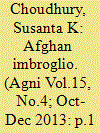

|
|
|
|
|
| Publication |
2013.
|
| Summary/Abstract |
The 11 September attacks in the United States caused NATO to invoke article 5 of the NATO charter for the first time in history. The article states that an attack on any member shall be considered to be attack on all. The invocation was confirmed on 4 October 2001 when NATO determined that the attacks were indeed eligible under the terms of North Atlantic Treaty Organisation, Eagle Assist and Operation Active Endeavour, a naval operation in the Mediterranean sea and is designed to prevent the movement of terrorists or weapons of mass destruction as well as to enhance the security of shipping the general which began on 4 October 2001.
|
|
|
|
|
|
|
|
|
|
|
|
|
|
|
|
| 2 |
ID:
104786
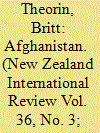

|
|
|
| 3 |
ID:
110305


|
|
|
|
|
| Publication |
2012.
|
| Summary/Abstract |
In the United States, the decision to go to war has often been propelled by a singular event, a 'trigger' that both galvanises and unites, at least temporarily, the US Congress, the nation's press and the American public. The attack on Pearl Harbor precipitated US entry into the Second World War, and the attack on the World Trade Center on 11 September 2001 led to American military involvement in Afghanistan. In both instances, thousands of innocent Americans had been killed on American soil by an easily identifiable, foreign enemy. The United States entry into the Korean War resulted from a somewhat different kind of trigger. While US forces were not directly attacked, there was, as President Lyndon Johnson's Deputy Undersecretary of State George Ball once wrote, 'a massive land invasion by 100,000 troops … a classical type of invasion across an established border'. Ball argued that North Korea's invasion of South Korea in June 1950 provided 'an unassailable legal and political basis for counteraction'.
|
|
|
|
|
|
|
|
|
|
|
|
|
|
|
|
| 4 |
ID:
123956
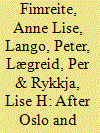

|
|
|
|
|
| Publication |
2013.
|
| Summary/Abstract |
The article addresses the challenges a society faces to when trying to balance security and liberty after a terrorist attack. A main question is to what extent attitudes toward counterterror measures changed in Norway after the massive terror attacks in July 2011. A hypothesis that people will be more in favor of such measures after a terror attack is examined using data from two surveys-one conducted in 2006 and one in August 2011, with additional results from a survey in 2012. The Norwegian response after the 2011 attacks is compared to the response to the same questions in the United States shortly after 11 September 2001. A main finding is that in Norway, in contrast to the United States, levels of support for counterterror measures declined immediately after the attacks. The authors argue that this can be explained partly by the different levels of trust in the two countries, and partly by differences in the political executive's framing of the crisis. In 2012, support of counterterror measures in Norway has risen to pre-2011 levels. This is related to the changed discourse after the publication of the report from the 22 July Commission.
|
|
|
|
|
|
|
|
|
|
|
|
|
|
|
|
| 5 |
ID:
133289
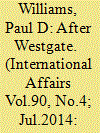

|
|
|
|
|
| Publication |
2014.
|
| Summary/Abstract |
The attack on the Westgate Mall in Nairobi, Kenya, in September 2013 intensified international scrutiny of the war against Harakat Al-Shabaab Mujahideen (Movement of the Warrior Youth). This article analyses the current state of affairs with reference to the three principal sets of actors in this war: Al-Shabaab, the African Union Mission in Somalia (AMISOM) and its international partners, and the various actors currently involved in building the Somali Federal Government's security forces. It argues that although the newly reconfigured Al-Shabaab poses a major tactical threat in Somalia and across the wider Horn of Africa, the movement is becoming a less important actor in Somalia's national politics. As Al-Shabaab loses territory and its popularity among Somalis continues to dwindle, other clan- and region-based actors will become more salient as national debates over federalism, the decentralization of governance mechanisms beyond Mogadishu and the place of clannism will occupy centre stage. As a consequence, AMISOM's principal roles should gradually shift from degrading Al-Shabaab towards a broader stabilization agenda: encouraging a national consensus over how to build effective governance structures; developing an effective set of Somali National Security Forces; and ensuring that the Federal Government delivers services and effective governance to its citizens, especially beyond Mogadishu in the settlements recently captured from Al-Shabaab. As it stands, however, AMISOM is not prepared to carry out these activities. More worryingly, nor is the Somali Federal Government.
|
|
|
|
|
|
|
|
|
|
|
|
|
|
|
|
| 6 |
ID:
076942
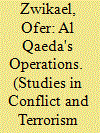

|
|
|
|
|
| Publication |
2007.
|
| Summary/Abstract |
In recent years, Al Qaeda succeeded in perpetrating several terrorist attacks that were successfully calculated and executed. Each operation may be considered to be analyzed as a project. This article analyzes the events taken by Al Qaeda prior to their operations, focusing on planning, controlling, and decision-making processes, using common tools from the project management area. This unique approach enables an understanding of the operational aspects of Al Qaeda and the managerial processes that its leaders were focused on. It was found that Al Qaeda's greatest managerial strength lies in human resource management, which includes team members recruiting, developing a clear organizational structure, team developing and team members motivating. Al Qaeda's greatest weakness lies in time management, resulting with many operations' schedule delays
|
|
|
|
|
|
|
|
|
|
|
|
|
|
|
|
| 7 |
ID:
068952
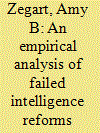

|
|
|
| 8 |
ID:
133679
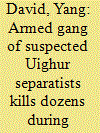

|
|
|
|
|
| Publication |
2014.
|
| Summary/Abstract |
Dozens of people were reportedly killed in an incident official Chinese state media described as a premeditated and co-ordinated terrorist attack in Shache (Yarkant) country. Kashgar prefecture, in the southwest corner of the Chinese region of Xinjiang on 28 July.
|
|
|
|
|
|
|
|
|
|
|
|
|
|
|
|
| 9 |
ID:
125960
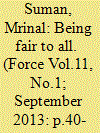

|
|
|
|
|
| Publication |
2013.
|
| Summary/Abstract |
Goldwater-Nichols Department of Defence Reorganisation Act of 1986 (GNA) is generally considered to be the first step in the currently ongoing Revolution in Military Affairs (RMA).
Major blame for the US failure in the Vietnam War was apportioned to segregated planning and operations, resulting in inhibiting the development of a unified war strategy. The catastrophic failure of the Iranian hostage rescue mission in 1980, the infirmities noticed in the invasion of Grenada in 1983 and inability to respond appropriately when 241 US marines were killed in a terrorist attack in Lebanon convinced all that emergent reforms were needed in the US defence organisation
|
|
|
|
|
|
|
|
|
|
|
|
|
|
|
|
| 10 |
ID:
096055
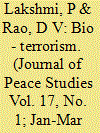

|
|
|
| 11 |
ID:
144630


|
|
|
| 12 |
ID:
122091


|
|
|
| 13 |
ID:
086256


|
|
|
|
|
| Publication |
2009.
|
| Summary/Abstract |
The paper reviews the experience of the group Nord-Ost (The Regional Social Organisation for Assistance and Defence of the Victims of Terrorist Acts) as an example of an NGO that has taken a rights advocacy position which has led it into confrontation with the state. Nord-Ost demands the state's accountability for the consequences of its response to the 2002 Dubrovka terrorist attack. Thus, it confronts challenges common to other rights advocacy groups in Russia today.
|
|
|
|
|
|
|
|
|
|
|
|
|
|
|
|
| 14 |
ID:
122562
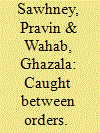

|
|
|
| 15 |
ID:
104718
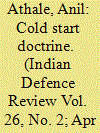

|
|
|
| 16 |
ID:
075440
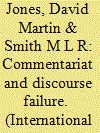

|
|
|
| 17 |
ID:
125575
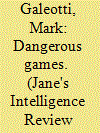

|
|
|
|
|
| Publication |
2013.
|
| Summary/Abstract |
In the run up to the 2014 winter Olympics, Russian security forces are working on disrupting insurgent groups in advance. Mark Galeotti takes a look at what has already been done and what constitutes the biggest threat to a peaceful games.
|
|
|
|
|
|
|
|
|
|
|
|
|
|
|
|
| 18 |
ID:
132280


|
|
|
|
|
| Publication |
2014.
|
| Summary/Abstract |
The use of conventional armed forces in a deterrent role merits close consideration. Instability in weak or failing states can have global ramifications, while efforts to build stability take time. In principle, conventional deterrence can be used to buy the time required for such stabilization efforts. Attempts at deterrence will, however, need to overcome credibility problems stemming from the technical limitations associated with conventional armed forces, and with the likely requirement for multiple external actors to deter multiple intrastate audiences. While deterrence might work under certain circumstances, it will not play as central a role in strategy as it did during the Cold War.
|
|
|
|
|
|
|
|
|
|
|
|
|
|
|
|
| 19 |
ID:
106639
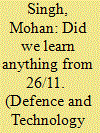

|
|
|
| 20 |
ID:
105640
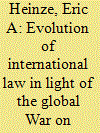

|
|
|
|
|
| Publication |
2011.
|
| Summary/Abstract |
This article explores how various aspects of the 'global War on Terror' may be affecting the future development of international law on the use of force. I examine these effects within three areas of international law - the law of anticipatory self-defence, the law of self-defence against non-state actors, and the applicability of international humanitarian law to non-state armed groups. Only in the latter two areas do I find evidence that international law is evolving to accommodate the new realities of global terror. While such developments in the law reflect the supposed need by states to use military means to combat terrorism, they also seem to confer at least a limited international legal personality upon terrorist groups such as Al-Qaeda. This not only indicates a shift in the basis for legal personality, but also potentially undermines the legitimacy of international law and frustrates states' efforts at combating terrorism.
|
|
|
|
|
|
|
|
|
|
|
|
|
|
|
|